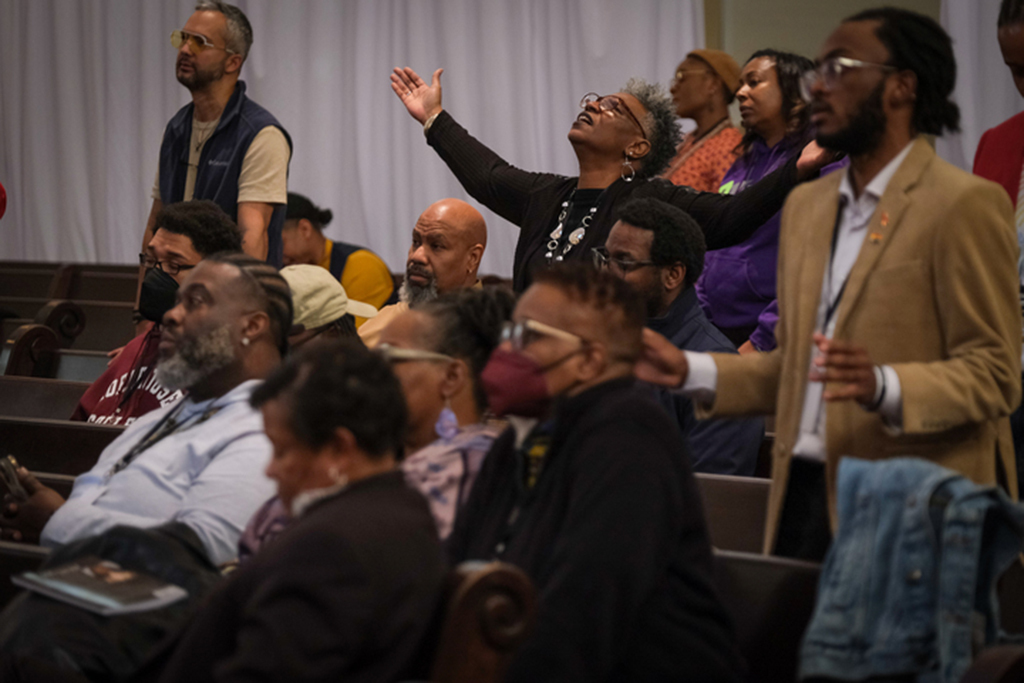‘Pride In The Pews’: Religious LGBTQ+ Reform Efforts Explore State Of The Black Church
Source: Dr. Ralph Basui Watkins/Pride in the Pews
ATLANTA – Pride in the Pews (PITP), a Chicago-born grassroots nonprofit, hosted the State of the Black Church Symposium last weekend at Spelman College, a historically Black institution of higher learning in Atlanta. The event aimed to address queerphobic theologies, promote healing and foster advocacy in the Black church through various discussions featuring faith leaders in the LGBTQ+ community.
The event was an extension of the year-round work the organization engages in to further its overall mission – creating more affirming sacred spaces and advocating for LGBTQ+ nondiscrimination.
Supporters from across the country – including Texas, Chicago and New York – joined PITP founder Don Abram in conversations he said he hoped would bring answers on how to fight oppressive narratives around faith, sexuality, gender identity and race.
Abram said his work is inspired by the Christian deity, Jesus, who historically accepted the marginalized and ousted. Also, by the Black church and its verifiable acts that challenged systems of oppression since its inception.
According to the Bible, the religious text of Christianity, Jesus sustained traditional Jewish standards that forbid same-sex romantic relationships. In Matthew 5:17 he says, “I did not come to abolish the law of Moses or the writings of the prophets, I came to accomplish their purpose.” His disciples followed suit advising followers as in 1 Corinthians 6:9-10 that, “neither those who indulge in sexual sin, or who worship idols, or commit adultery, or practice homosexuality…will inherit the kingdom of God,” which is the ultimate goal of those who practice Christianity.
Members of the LGBTQ+ community identify these and other scriptures which oppose same-sex relations as “clobber passages,” stating many pastors and priests continue to deploy the Bible in ways that exclude and condemn queer people.
Pride in the Pews founder Don Abram. | Source: Dr. Ralph Basui Watkins/Pride in the Pews
Though PITP upholds an obvious reiteration of the traditional Christian beliefs, Abram refutes the claims that they are attempting to change these norms in the Black church. Instead, he expresses that their efforts hope to bring an “appropriate evolution” that results in an inclusive church environment.
“The Black church was born fighting against systems of oppression. By living in my queerness and choosing to advocate in the Black church and outside of it, I’m doing the same thing,” Abram says. “I am choosing to challenge systems of oppression, live into the truth of who I am and construct a theology, like the early Black Church did [when fighting slave masters], that says ‘if your theology suggests that I am other and that I am not loved by God, I wholeheartedly reject it and I am going to create a theology that speaks to the fullness of who I am.’”
Attendees echoed the desire for safe, inclusive spaces in and out of houses of worship.
Dayshawn Nelson of Atlanta shared he is not fully accepted and acknowledged at church because he is openly queer. “The church will reach out to the man or woman on the street but when it comes to the LGBTQ+ community they don’t acknowledge us. What makes us different? Why is that the case? What can we do to change that and make it better,” he asks.
Dr. LuLu, mother of a transgender woman and proprietor of Dr. LuLu’s Pride Corner which provides life coaching to parents of transgender children, presented similar sentiments. “A place like church where people go to find God should never be anything but safe,” she explained. “I grew up Catholic, and though I am no longer practicing Christianity, I understand the value of an organization like Pride in the Pews, which is doing the right thing in teaching others that everyone matters and everyone is equally important, especially in the deep south of Georgia and the Black community as a whole.”
Abram says his ideal church is the “advocating church.” One that leverages its power, platform and tradition to fight for those whom society has “left out and behind.” He and PITP continue their efforts to equip and enable churches to become advocates via the Black Church Equality Fellowship (BCEF), a premier leadership development program for Black faith leaders advancing LGBTQ+ inclusion in their local congregational context.
Source: Dr. Ralph Basui Watkins/Pride in the Pews
According to PITP, 71% of Black American LGBTQ+ adults are religious, yet none of the eight historically Black Christian denominations theologically affirms LGBTQ+ individuals.
BCEF curriculum aims to partner with church leaders to move their congregation along the path from being an antagonizing and avoiding church to an accepting, affirming, and ultimately, advocating church.
PITP Senior Operations Manager and BCEF fellow, Tierney Ridley, says the program helps her to live at the intersection of who she is as a minister and a queer person. Ridley believes BCEF presents an opportunity for Black church leaders to understand the difference between othering and creating a space of belonging for themselves and the 194,000 Atlanta residents who identify as LGBTQ+.
Overall, Abram says he and PITP desire spaces that foster better spiritual, mental and physical health outcomes for all people.
“We are not interested in convincing you or converting you to adopt our worldview,” Abrams said. “We’re inviting you to be curious about our lived experience, to lean into a narrative that may be unfamiliar or offensive to you. And our ultimate hope is that you will walk away with a better, fuller understanding of the capaciousness of God’s creativity. We are inviting you to be introduced to the facets of God that you may be unfamiliar with.”
SEE ALSO:
The Bible And Black People: A Torrid Love Affair
Black Churches In Florida Are Teaching Non-Whitewashed Black History Since The State Won’t
The post ‘Pride In The Pews’: Religious LGBTQ+ Reform Efforts Explore State Of The Black Church appeared first on NewsOne.

